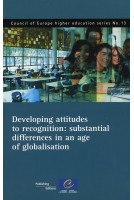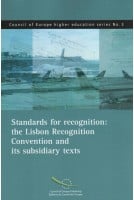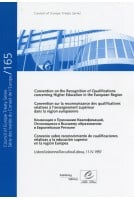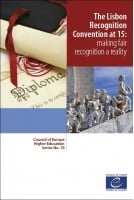



Recognition of qualifications is one of the Council of Europe’s main activities in the field of higher education and research.
The Council of Europe, in co-operation with UNESCO, drafted the Convention on the Recognition of Qualifications concerning Higher Education in the European Region, more briefly referred to as the ‟Lisbon Recognition Convention” because it was adopted in Lisbon in 1997. This Convention is the main legal instrument on the recognition of qualifications in Europe. It has, to date, been ratified by more than 50 states. It promotes fair recognition of academic qualifications
This report summarises the results of the first round of monitoring of the implementation of the Lisbon Recognition Convention since its signature in 1997. It presents the key findings and conclusions of a survey on the recognition of qualifications in higher education and lays out the recommendations made by the Lisbon Recognition Convention Committee. These recommendations will require further political decisions on follow-up action from the committee and from the national authorities.
List of figures and tables
Foreword
Country codes
Executive Summary
1. Criteria and Procedures
2. Time Limit
3. Right to Appeal
4. Substantial differences
5. Refugees’ qualif ications
6. Information on Education Systems
7. Information on Higher Education Institutions
8. National Information Centre
9. Resources to enable the National Information Centre to fulf il its functions
Conclusions
APPENDICES
Appendix 1 – Questionnaire
Appendix 2 – List of Institutions which replied to the questionnaire
Download an extract (0)





Recognition of qualifications is one of the Council of Europe’s main activities in the field of higher education and research.
The Council of Europe, in co-operation with UNESCO, drafted the Convention on the Recognition of Qualifications concerning Higher Education in the European Region, more briefly referred to as the ‟Lisbon Recognition Convention” because it was adopted in Lisbon in 1997. This Convention is the main legal instrument on the recognition of qualifications in Europe. It has, to date, been ratified by more than 50 states. It promotes fair recognition of academic qualifications
This report summarises the results of the first round of monitoring of the implementation of the Lisbon Recognition Convention since its signature in 1997. It presents the key findings and conclusions of a survey on the recognition of qualifications in higher education and lays out the recommendations made by the Lisbon Recognition Convention Committee. These recommendations will require further political decisions on follow-up action from the committee and from the national authorities.
Please note that in accordance with our terms & conditions, PDF/epubs may only be purchased by private individuals.
